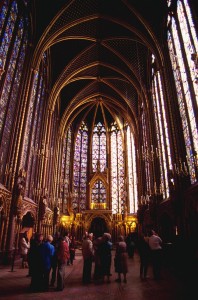The Sacraments And Union With God
 In a previous work, we defined the sacraments as (among other things) signs that facilitate communion with the God who is One in Three Persons. In short, according to the Apostle Peter, we become “partakers of the divine nature” as we grow in holiness. Before we can continue this discussion, we need to ask ourselves something. What is the point of Communion with God?
In a previous work, we defined the sacraments as (among other things) signs that facilitate communion with the God who is One in Three Persons. In short, according to the Apostle Peter, we become “partakers of the divine nature” as we grow in holiness. Before we can continue this discussion, we need to ask ourselves something. What is the point of Communion with God?
While this question might seem simple, it has sparked a lot of debate throughout Catholic circles. John Paul II’s Man and Woman He Created Them could be viewed a lengthy and substantial answer to this question. Ever since the Garden of Eden, man has asked himself this very question.
There are a lot of ways to look at this. For some, we walk around with our palms pressed together chanting softly in praise and adoration of God. For others, communion with God is a nuptial union that surpasses any human emotion or experience. Then there are those who view attempting to describe heavenly realities with human expressions as utterly pointless. Whatever it is, we know it will be better than here.
All of these are true, and I suppose they come into play one time or another in heaven. Yet as true as they all are, their answers are incomplete. They are means, not the end. Why does God wish to “marry us?” What is the purpose of God providing peace? As always, the answer may be found within the Scriptures, starting with God’s call to Abram:
And the Lord said to Abram: Go forth out of thy country, and from thy kindred, and out of thy father’s house, and come into the land which I shall shew thee. And I will make of thee a great nation, and I will bless thee, and magnify thy name, and thou shalt be blessed. I will bless them that bless thee, and curse them that curse thee, and in thee shall all the kindred of the earth be blessed. (Genesis 12:1-4)
Now the classical understanding of this passage has always been that God showed Abram the land of Israel, and promised that land towards his descendants. To Christians (possessing the fullness of revelation), though the original meaning remains true, we discover something far deeper. The writer to the Hebrews describe Abraham’s experience as follows:
For he looked for a city that hath foundations; whose builder and maker is God…. All these died according to faith, not having received the promises, but beholding them afar off, and saluting them, and confessing that they are pilgrims and strangers on the earth… Therefore God is not ashamed to be called their God; for he hath prepared for them a city.(Hebrews 11: 10,13,16)
As with just about everything in the Old Testament, what is happening is but a sign of a greater reality that will come. When Abraham looked at “the land” which God would give him, he was not looking at some mere human city. Rather he was looking at heaven, that which God designed and prepared for them, and invites those who have faith to enter into.
What would we find in such a city? We may perhaps best understand what we could have by seeing what the faithless were denied. We can find that answer many times throughout the beautiful Psalms of David:
Lord, who shall dwell in thy tabernacle? or who shall rest in thy holy hill? (Psalm 14:1)
Today if you shall hear his voice, harden not your hearts: As in the provocation, according to the day of temptation in the wilderness: where your fathers tempted me, they proved me, and saw my works. Forty years long was I offended with that generation, and I said: These always err in heart.
And these men have not known my ways: so I swore in my wrath that they shall not enter into my rest. (Psalm 94: 8-11)
This last Psalm is of particular importance to us. The writer of the Hebrews gives a rather lengthy commentary on this Psalm that needs to be quoted in full:
For we, who have believed, shall enter into rest; as he said: As I have sworn in my wrath; If they shall enter into my rest; and this indeed when the works from the foundation of the world were finished… Let us hasten therefore to enter into that rest; lest any man fall into the same example of unbelief. (Hebrews 4: 3,11)
While we receive countless things in the heavenly city, most importantly, we find rest. This is something even Adam did not have, as he had to work in the garden even before the fall. Throughout salvation history God’s people have been nomads and they have been builders of empires. They have been minorities and majorities. They experienced ecstasies and sorrows, peace and war. Yet all of them had the same purpose: they had to work. In the fullness of time, Christ came to bring us towards the home where we will have to do none of these things. We will have rest.
With this in mind, we can garner some important things about the sacraments. As they are meant to facilitate communion with God, they are meant to help us enter into God’s rest. They are a bulwark against the distractions of the world, and serve as a reminder of the original reason God created us. They go beyond even this purpose though, bringing us slowly but surely towards the same home the saints hoped for throughout history.

